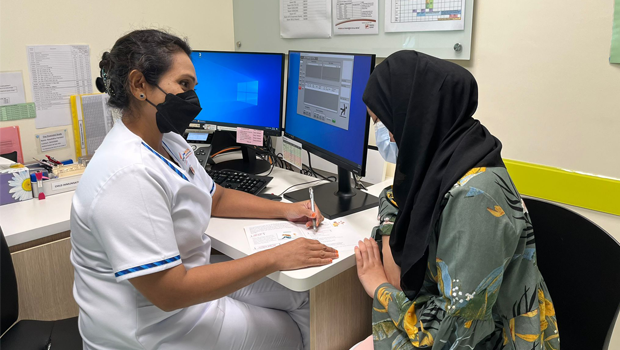
To learn more about how we empower our residents to keep well, get well and live well, click here.
Launched in 2019 at Punggol Polyclinic, the Integrated Maternal and Child Wellness Hub (IMCWH) is part of SingHealth's efforts in preventive care to better support families with young children. Senior Staff Nurse (SSN), Zarina Bte Yusoff shares on the benefits she has seen.
SSN Zarina Bte Yusoff's oldest child is now 15 years old, but the memories of his newborn days are still fresh in her mind. Despite the joy of welcoming her child into the world, she felt overwhelmed with anxiety and was easily reduced to tears.
Experience has taught the Senior Staff Nurse from SHP–Punggol, that these feelings are normal among new mothers. "With sleep deprivation, the commitment to breastfeed and changes in hormones during postnatal, mothers are stressed and don't always know what to do", she said. The problem arises when mothers are unable to meet their own needs, and do not receive the support required.
This is something she hopes to change with her work at the Integrated Maternal and Child Wellness Hub (IMCWH).
The IMCWH is Singapore's first community hub for child development and maternal health. It expands on existing polyclinic services such as immunisations and basic health checks by providing children with enhanced developmental screenings and growth monitoring, thereby enabling early detection of any developmental delays.
For example, previous standard of care for Child Development Screening (CDS) was done at 9 months, 18 months, and 36 months. Based on findings from IMCWH, the enhanced development screening (EDS) was modified to focus on 18 months and 30 months development assessment in all SHP. The EDS has shown increased positive screening rate from the before and after comparison. More children are also referred earlier for intervention.
Importantly, the IMCWH also provides mothers with nutritional advice for their children, lactation support, and screening for postnatal depression to help them adjust to their new roles.
Supporting the transition to motherhood
The pilot programme started in 2019 at Punggol Polyclinic, as a three-year partnership between KK Women's and Children's Hospital (KKH), SHP and Temasek Foundation.
SSN Zarina, who has been working as a nurse since 2006, leapt at the opportunity to participate. She eagerly attended trainings by KKH specialists on topics such as postnatal depression, child development, and conducting developmental assessments.
"I felt it was meaningful because polyclinics used to focus more on chronic care, but with the IMCWH, we would expand the focus to the younger generation," she explained.
She added that polyclinics are the perfect touchpoint to reach mothers who need support. This is because mothers regularly visit a polyclinic for their child's vaccinations or jaundice assessments. "When they do, we can reach out and ask if we can help with their emotional health or lactation issues," she said.

This in turn opens the door for mothers to share about their difficulties. "The feedback we have received shows that mothers are grateful that we bothered to ask about their well-being, because they would just keep quiet otherwise," SSN Zarina added.
Within the first two years of its run at SHP-Punggol, the IMCWH screened over 5,000 mothers. Two per cent were found to have potential postnatal depression and referred to appropriate support, either within the polyclinic, or at KKH.
Letting no child fall through the gaps
During the same period, eight per cent of over 8,000 children screened were also found to have possible developmental delays and referred for intervention.
SSN Zarina shared that she found the multiple screenings for children to be particularly effective. To elaborate, she cited an example of a child who was identified as displaying autistic traits at 18 months of age. The child's grandmother did not think it was necessary to see a specialist, and the family did not follow up on the referral — until the same findings reappeared at the child's check-up at 30 months.
Using the child's records, she was able to convince the parents of the screening's reliability, address their concerns, and ultimately ensure that the child receive the support needed.
A future of healthier children and happier mothers
The pilot phase of the IMCWH ended in April 2022, but SSN Zarina is heartened that the programme will continue to run and has been expanded to SHP-Tampines and SHP-Bedok, and subsequently to SHP-Sengkang by the end of 2023. The IMCWH at SHP-Punggol is also now being incorporated as one of the four pilot sites of a new multi-agency collaborative programme called Family Nexus, co-led by the Ministry of Health and Ministry of Social and Family Development, which will bring health and social services together at the same site to provide more holistic support for children and their families.
As part of the pioneering team, SSN Zarina supports her Nurse Clinician with the progressive roll-out of the IMCWH by training other SHP nurses, which includes a two-week attachment at SHP-Punggol.
Reflecting on the work she has done with the IMCWH so far, she is grateful for the opportunity she has had and is excited to see what comes next. "I find fulfilment and satisfaction in making an impact on people, no matter how big or small it is," she said.
Get updates on Tomorrow's Medicine in your mailbox!
Click here to subscribe
